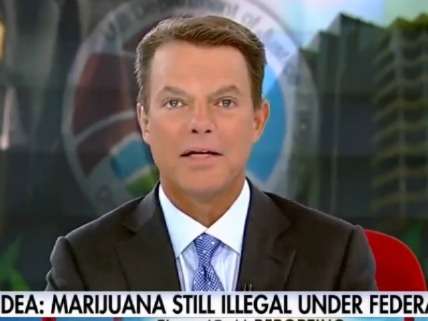Congress and the DEA Share the Blame for Marijuana's Mystifying Misclassification
The Controlled Substances Act established arbitrary rules that make it impossible to properly categorize many drugs.

Last week the Drug Enforcement Administration was widely criticized for refusing to move marijuana out of Schedule I, the most restrictive drug category under the Controlled Substances Act. But as I explain in my latest Forbes column, Congress shares the blame for marijuana's puzzling legal status because it created a classification scheme that defies logic:
Last week, when the Drug Enforcement Administration (DEA) rejected two petitions asking it to reclassify marijuana, Fox News anchor Shepard Smith did not try to conceal his contempt. "LSD, MDMA, a plant that grows in the yard—all one thing," he said sarcastically. "The DEA announced today it will keep marijuana on the list of the most dangerous drugs in all the world, along with heroin, LSD, and MDMA….Thanks, DEA, you've really got a lot of credibility."
Smith's dismay was echoed by activists, scientists, commentators, and members of Congress from both major parties, who said the DEA's decision was at odds with what we know about marijuana's hazards and benefits. There is a lot of truth to that critique, and the DEA can reasonably be faulted for stubbornly refusing to remove marijuana from Schedule I of the Controlled Substances Act (CSA), a category that is supposedly reserved for drugs with "a high potential for abuse," "no currently accepted medical use," and "a lack of accepted safety for use…under medical supervision."
But bureaucratic intransigence is only part of the story. The other part is the CSA itself, a legal morass that leaves crucial phrases undefined, gives the DEA wide discretion to decide where drugs belong, and establishes arbitrary, inconsistent rules that make it impossible to properly classify many drugs.
Editor's Note: As of February 29, 2024, commenting privileges on reason.com posts are limited to Reason Plus subscribers. Past commenters are grandfathered in for a temporary period. Subscribe here to preserve your ability to comment. Your Reason Plus subscription also gives you an ad-free version of reason.com, along with full access to the digital edition and archives of Reason magazine. We request that comments be civil and on-topic. We do not moderate or assume any responsibility for comments, which are owned by the readers who post them. Comments do not represent the views of reason.com or Reason Foundation. We reserve the right to delete any comment and ban commenters for any reason at any time. Comments may only be edited within 5 minutes of posting. Report abuses.
Please to post comments


But as I explain in my latest Forbes column, Congress shares the blame for marijuana's puzzling legal status because it created a classification scheme that defies logic:
The logic is perfectly obvious here once you realize that the goals of Congress, in passing the Controlled Substances Act, had nothing to do with furthering public safety. It was all about exercising power.
(Maybe Sullum covers this in the article, but I refuse to disable my Ad blocker).
According to Nixon it was about hurting the Democratic voting base.
The DEA has zero reasons to correctly schedule MJ, and many million$ of reasons not to. The incentives aren't complicated.